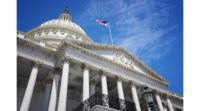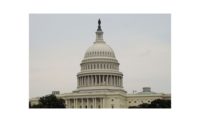UPDATE as of August 15, 2018 —
On August 13, President Trump signed the John S. McCain National Defense Authorization Act for Fiscal Year 2019, which authorizes FY2019 appropriations and sets forth policies for Department of Defense (DOD) programs and activities.
The law also includes a policy that caused concern among several Chinese suppliers of video surveillance equipment. Beginning in August 2019, government agencies (e.g., cabinet-level departments, military branches, and others facilities such as federal prisons) will be banned from buying or contracting to buy telecommunications equipment produced by Huawei Technologies Company or ZTE Corporation, or video surveillance equipment produced by Hytera Communications Corporation, Hangzhou Hikvision Digital Technology Company, or Dahua Technology Company. It also bars the purchase of any such equipment produced by an entity believed to be owned or controlled by the Chinese government.
Additionally, beginning in August 2020, these government agencies will also be barred from entering into, extending or renewing a contract with an entity that uses any of the above-mentioned telecommunication and video surveillance equipment.
This second provision is most concerning to the specified firms, uncertain about how broadly the ban will be interpreted.
Hikvision commented in a statement: “The ban itself will not have substantial impact on the company’s business. But due to its unclear points and semantic ambiguity in some terms, the bill might generate broader interpretations, which could extend the ban from federal agencies to non-federal installations [from using our products].”
SIA CEO Don Erickson stated, “SIA is researching the language of the NDAA and seeking guidance on how some specific provisions related to the security industry will be interpreted.”
According to Jennifer Mapes-Christ, senior analyst and manager of the consumer & commercial goods group at the Freedonia Group, “The U.S. government market for video surveillance systems is expected to exceed $700 million by 2021. While that is a relatively small piece of the total U.S. market for these products, there are some significant areas of growth for high-tech video surveillance equipment in the government market, including the ‘digital wall’ along the U.S.-Mexico border featuring advanced surveillance and analytics technology.”
Furthermore, she noted, “China-based firms are becoming increasingly important suppliers to the U.S. video surveillance market. Hangzhou Hikvision has been a rapidly growing player, rising to one of the top 5 firms by 2016, due to its ability to compete on both price and quality.”
Mapes-Christ continued, “Much like the larger consumer electronics industry, the manufacture of video surveillance products has largely shifted to Asian countries, particularly in countries with low labor costs. Furthermore, the well-known production processes make these products easy to manufacture and transport. Imports — the lion’s share of which come from China — now account for the nearly all of the video surveillance equipment sold in the U.S.”
She added, “Although Huawei and ZTE have been marked as national security threats by the U.S. since 2012, concern about security vulnerability of cameras provided by other China-based firms as well has been increasing over the last few years. Concern is particularly extended to companies with ties to the Chinese government with the perception that they might be able to exercise control over the equipment.”
***
The National Defense Authorization Act, which has now passed both the House and Senate and awaits the President’s signature, does include language that would prohibit the U.S. government from using cameras from certain Chinese manufacturers, including Dahua and Hikvision.
SDM reported earlier that the Senate version did not include the language banning the Chinese manufacturers; however, the final version the two chambers agreed upon and passed August 1 did include the language, causing the stocks of both companies to take significant hits — nearly 10 percent — in the following days, several news organizations reported.
The ban is not expected to have significant impact on the company’s business, Hikvision said in statement after the bill passed; however, the companies fear ambiguous language in the bill could allow for interpretations of the law that would extend the ban from just federal government agencies to non-federal institutions.
Hikvision is setting up a team to provide a more accurate interpretation of the bill and determine possible ramifications.
Hikvision also claims the bill’s ban is based on insufficient evidence, review or investigation.








